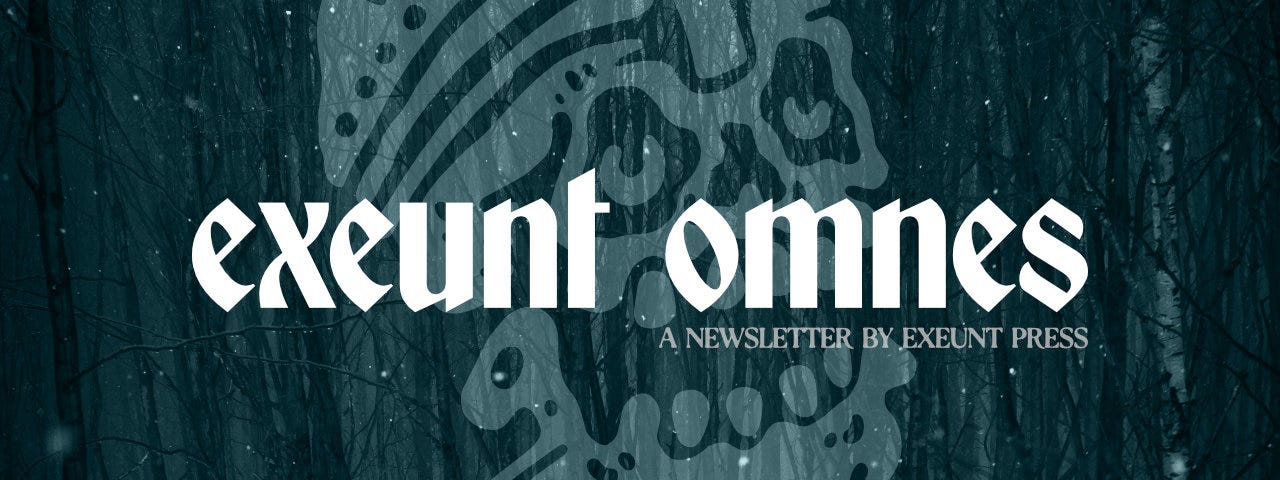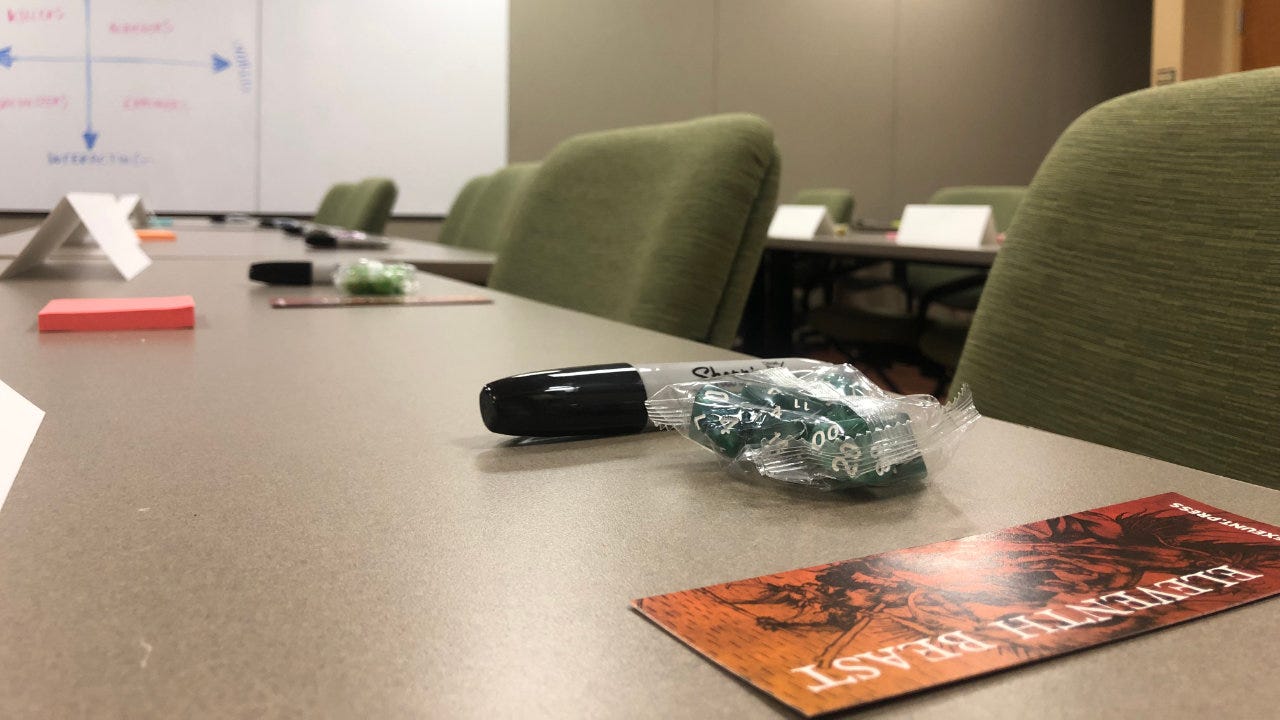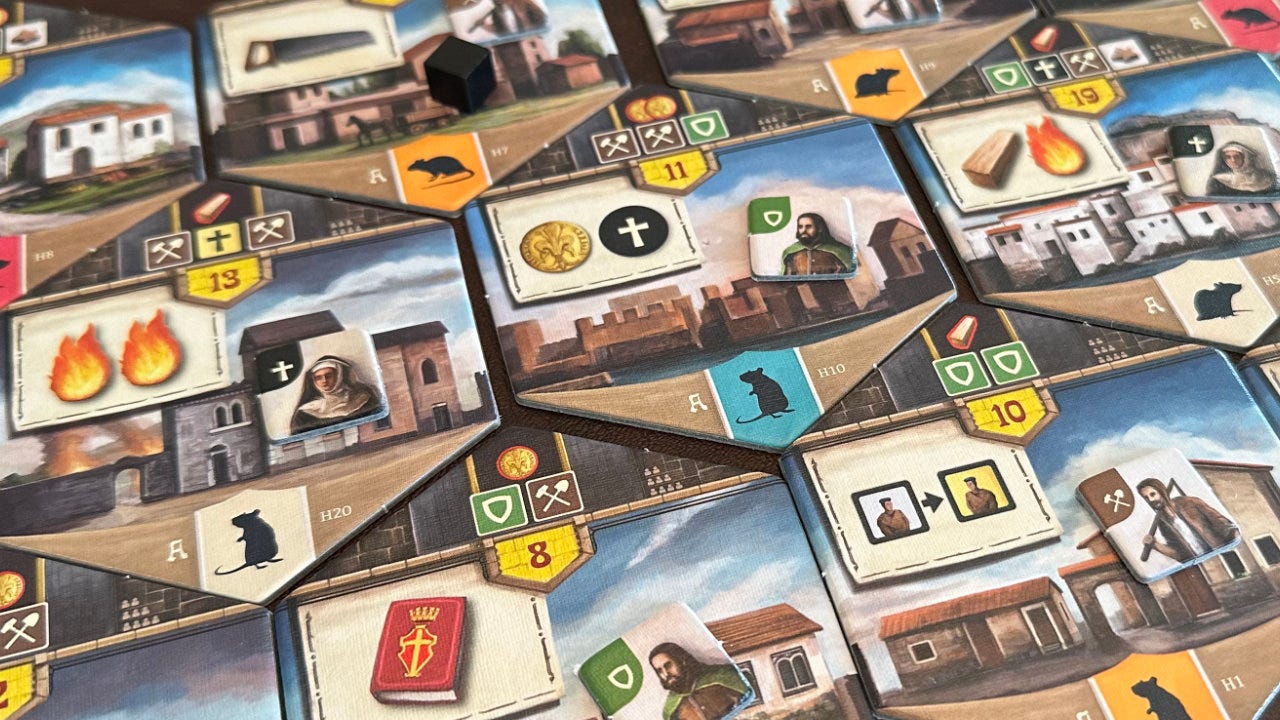Teaching game design at your library
Teaching at your public library, player agency, running MÖRK BORG, and Messina 1347
Welcome to Exeunt Omnes, the official newsletter for loyal fans and sworn enemies of Exeunt Press, creator of games such as Exclusion Zone Botanist and Eleventh Beast. You can find digital games at games.exeunt.press and physical products at shop.exeunt.press.
TL;DR Summary
📚 Teach game design at your library
🤔 Player agency and choice
🦴 Tips for your first MÖRK BORG game
🎲 Recently played: Messina 1347
📚 Teaching game design at a library
The tabletop game design class that I mentioned before has come to a close. It was four 75-minute sessions at my local public library, and an absolutely wonderful experience. The room was packed with 20 - 25 people each session, and everyone was engaged and full of insights and questions.
Each session had a presentation covering the topic, an in-class activity to try it out, and then a post-class activity to work on for next time. The after-class activity was modeled after the “Consume/Create” used in the Start With This podcast. We spent a few minutes at the start of each session reviewing what everyone created.
It was a really rewarding experience, and I’d encourage you to consider teaching a similar class at your public library.
Here are some of my learnings that might help:
Yes you can: You might be unsure if you know enough to teach a class. I’m here to say, you do and you should. Public libraries are always looking for help and support, and teaching a free class is one way to do it. If you’ve ever made a game and published it somewhere, you know enough to teach others.
Allow enough time to cover the topics: I had so much I wanted to cover, but just 75 minutes for each class. I think it’s better to cover fewer topics if that allows for more discussion, comments, and questions.
Do hands-on activities: One of the top positive feedback topics was the activities we did in class. It gave everyone a chance to apply what they learned and really understand it. The activities that involved pitching, making, and brainstorming game ideas were the best.
Activities don’t need to be complicated: One of our activities involved rolling on a table of random themes and trying to add some mechanisms to pitch a game. Another one was a simple player agency and iterative design exercise using a few cards. Simple activities make it easier for everyone to participate equally.
Game design theory is interesting: One of my goals was not just to teach how to make a game, but to teach how to think about games. Covering topics like the 8 Kinds of Fun and input/output randomness was worthwhile.
Provide optional post-class activities: I made it clear that it was optional, but provided exercises to try at home if you wanted more. While not everyone had the time or inclination, the ones that did came up with some really awesome stuff! People really appreciated having the option.
Create a single-page resource: I made a single webpage that was easy to reach (i.e. no login) and made sure the QR code was on all the handouts. The page included some of the class logistics (e.g. times, etc.), contact info, and the resources for each week.
Use Skeleton Code Machine articles: Each week I included links to relevant Skeleton Code Machine articles along with the Consume/Create activity. Most people felt they were helpful and appreciated having them listed.
Check out URF Academy: The free, Riot Games URF Academy curriculum is a great starting place to get ideas. It has six modules including lessons and activities.
Consider TTRPGs vs. board games: I attempted to cover both TTRPGs and board games in the class because I feel the distinction can and should be blurred. This may have made it a little harder to teach the class because people seemed to fall into “board gamer” or “roleplayer” categories. It might makes sense to pick one or the other for future classes.
Hackable TTRPGs and SRDs were a hit: If you are reading this newsletter, you are probably familiar with third-party licenses, SRDs, and hackable TTRPGs. The topic was new, however, to most people in the class! Lots of positive feedback on including this topic, and I was thrilled to see how it inspired people to make things.
Allow time for post-class conversations: The class ended at 7 p.m. each night, but it was usually 7:30 p.m. until everyone was done chatting. Some of those conversations were the best, and I’m glad there was time to do that before the library closed. Build that time into your schedule.
Provide free stuff: In addition to printed handouts, I was able to find some very affordable polyhedral dice sets to hand out to everyone in the class at the first session. Everyone also got a trifold version of Exclusion Zone Botanist and Eleventh Beast. I realize this may not be practicable for everyone, but I was glad to be able to do it.
Ask for help: I put out a call for support before the class and received a lot of offers! I was able to give out free materials, discounts, and/or download codes from Goblin Archives, Perplexing Ruins, Odd Gob Games, Serif Affinity, and Gabriel Toschi.
The survey results were overwhelmingly positive, and people were very kind with their comments. I definitely plan to do some similar classes (though not the same format) in the future.
Thank you to everyone who attended!
🤔 Player agency and choice
I’ve been thinking about player agency a lot recently. What does it mean to give players a choice? Is it really a choice if you don’t have information to help decide? How do we make choices that matter?
I tried to answer some of these questions in the first part of a series on player agency at Skeleton Code Machine. We looked at two different ways to define player agency, and used a simple example to demonstrate it.
READ: What does it mean to give players a choice? at Skeleton Code Machine
Skeleton Code Machine is a weekly publication that explores tabletop game mechanisms in board games and roleplaying games. It’s been called a “Seemingly endless source of gaming ponderings” and a “Goldmine.” Check it out at www.skeletoncodemachine.com.
🦴 Tips for your first MÖRK BORG game
I saw a thread on the MÖRK BORG subreddit asking for tips on how to run your first game. It’s a good question, and one that I asked the first time I ran Rotblack Sludge!
Here are some tips from that thread and other sources that I think are helpful:
Use Rotblack Sludge (included in the book) as your first adventure.
Quite a few people recommend Principia Apocrypha: Principles of Old School RPGs, or, A New OSR Primer as a starting point.
If your players try to do something that’s not in the rules, just make it up. Target numbers and opposed rolls are easy to make up on the fly.
Roll on random tables ahead of time. Prep and make some extra notes.
Use SCVMBIRTHER to make new characters on demand.
Death isn’t as common as you might think if you use Omens and caution.
If someone dies, get them back in the game with d66 Descriptions of a new PC arriving or d20 Descriptions of a New PC Instantly Arriving.
Someone suggested writing scrolls on actual little rolls of paper, and when opened they must be used immediately. An amusing idea!
If the party might travel, roll events on d666 Wildland Encounters ahead of time.
Some disagree, but it’s OK to give your starting characters some extra HP.
The Compatible with MÖRK BORG article at Skeleton Code Machine has some additional resources if you are new to the game. Also, the MÖRK BORG Discord server is full of helpful people!
READ: Compatible with MÖRK BORG at Skeleton Code Machine
🎲 Recently played: Messina 1347
I’m a fan of Vladimír Suchý’s work, so I was excited to try Messina 1347 (Aparicio & Suchý, 2021):
Messina 1347 takes place during the introduction of the plague epidemic (a.k.a. the "black death") and the spreading of its infection through town. During this time period, merchant ships delivering luxury goods to Europe brought to these countries an unprecedented epidemic — and one of the first affected cities was Messina, Italy.
It’s an interesting game with a lot of subsystems to manage. With just six turns, it’s a very tight action efficiency puzzle where you really need to focus on just one or two of the many ways to gain victory points.
PLAY: Messina 1347
Thanks for subscribing to Exeunt Omnes!
Check out games.exeunt.press for all the latest games and resources!
- E.P. 💀







As a game nerd and public librarian I want to say thank you! Anyone who wants to run a program in Maryland, let me know!!
What was the age range of the folks who attended the classes?